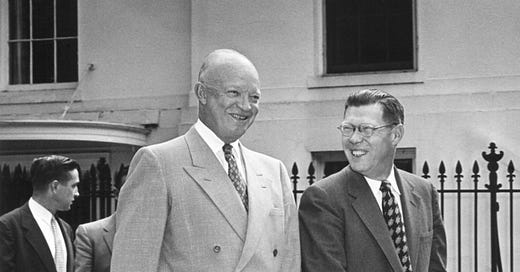White House press secretary Jim Hagerty worried that the candor of his boss, Dwight Eisenhower, would cause trouble for Ike's administration. Hagerty urged the president to give a no-comment reply to sensitive questions. Ike waved him off. “Don't worry, Jim," he said. “I'll just confuse them."
He often did, gaining a reputation as a general who couldn't figure out what he wanted to say. Ike chuckled to himself.
Tactical confusion has its place. But precision has merit too. Typically when we speak we try to be understood. English is a useful language for this, in that it has lots of words, allowing speakers to choose just the right ones to convey what they want to say.
Which makes it curious that there are certain words that permit not merely different meanings but opposite meanings. These are sometimes called contranyms, for contradicting themselves. If a president, say Donald Trump, wants to respond to the action of a foreign leader, say Vladimir Putin, he can sanction the action. What will this mean? One of two opposite things. Sanction can mean respond positively or respond negatively. Trump can sanction Putin's action by giving it America's blessing, or he can sanction Putin's action by freezing Russian assets in the United States.
International inspectors supervise countries’ compliance with various agreements, for example relating to nuclear nonproliferation. If they do their job well and identify infractions, they provide oversight. But if they get sloppy and miss one, they commit an oversight.
Smugglers attempt to screen contraband from the view of border guards, whose job is to screen for such illegal items. The smugglers are trying to conceal the illegal goods. The guards are trying to detect them.
Etymology, the study of how words came to have their meanings, is replete with idiosyncrasies. Every word history is unique. It's not surprising that oddities like the above cropped up. The striking thing is that they persist, especially when they involve such high stakes as war and peace.
Another curiosity is words that appear to be antonyms but in fact mean the same thing. I sometimes ask my students to do a thought experiment. Imagine they are driving a car down a steep hill and the brakes fail. Stopped on the roadway ahead are two tanker trucks. The car is certain to hit one or the other. One truck is labeled “Flammable." The other is labeled “Inflammable." Which truck would they rather slam into?
In fact it doesn't matter, if the sign painters have consulted a dictionary. The two words, seemingly opposite, mean the same thing, in this case a fireball.
If a contract requires a sports team to pay an athlete regardless of injuries, is that a better or worse contract for the athlete than one that requires the team to pay irregardless of injuries?
In fact the seeming antonyms are exact synonyms.
What kind of language is English that it allows such confusion to persist? Lives are at risk, and millions of dollars.
The answer is that it is an anarchic language. Unlike French and Spanish, for example, English has no governing body, no academy or other institution that dictates usage for its speakers and writers. The result is a open-source mess, a wikipedia with no board of editors. This absence of authority accounts for the strange and often maddening spelling of English words. “Though" and “cough" stopped rhyming long ago, but they're still spelled similarly because no one has been in position to compel a change reflecting the difference in pronunciation.
The messiness of English is also its usefulness and one of the reasons it has spread so far. The people of England won an empire that spanned the world but in doing so lost control of their mother tongue. American English has many more native speakers than English English. India has more speakers of English than England does. The official gatekeepers of French and Spanish try to weed out words borrowed from other languages, often English. There are no gatekeepers of English, which is filled with words borrowed from languages English colonialists encountered.
Young people constantly try to distinguish themselves from their elders, for example by giving old words new meanings. English has no tradition of organized pushback by the old folks, and the new meanings sometimes stick. In American popular culture in the 1960s, “bad" came to mean “very good." A dope used to be someone stupid but as an adjective it can signify excellent.
Sometimes new meanings, however acquired, crowd out old meanings. “Gay" in America is now more likely to mean homosexual than light-hearted.
But sometimes old meanings coexist with new ones. "British Invade Suez,” a 1956 headline might have read. "Ike Vows Sanction.”
Jim Hagerty couldn't have complained.




"In American popular culture in the 1960s, “bad" came to mean “very good.""
That usage persisted into the 1980s, as per Michael Jackson's hit record and album by that name.
There was a great book which I read and own "The Story of English: Revised Edition" By William Cran, Robert MacNeil, Robert McCrum made into a great PBS mini-series - FYI
https://www.youtube.com/playlist?list=PLh06URz4IJQ4aI0A-xjXOtx2OnApu2SNn